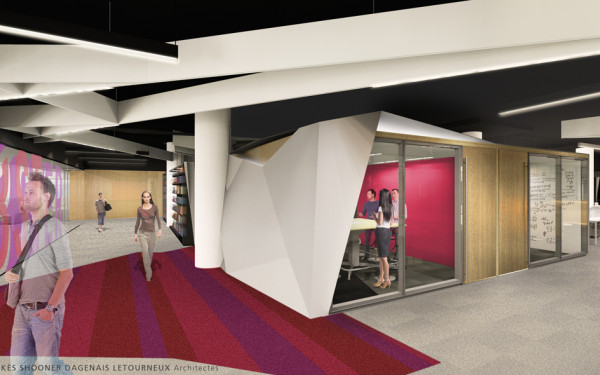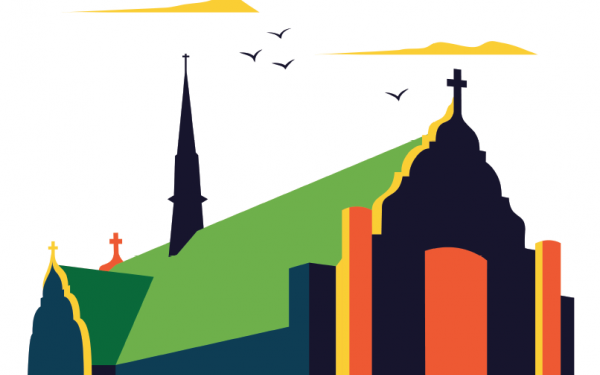A Meeting for Book Addicts
Library Lovers Discuss their Future in the Digital Age
In a room at the Atwater Library—beyond the circulation desk, up two flights of stairs and through a nondescript doorway—roughly 25 chairs were arranged in a circle on April 8. Slowly, people entered the room and filled the seats.
An animated discussion soon began, with participants introducing themselves before offering their thoughts. Words of encouragement from the moderator made even the shyest participants feel comfortable, like they could contribute to the conversation.
“I don’t know what I would do if I ever didn’t have a library [to go to],” admitted archivist Jeri Pitzel. “Have I become addicted to libraries? I love them so much.”
The topic of discussion was the future of libraries in the digital age. The Atwater Library and the University of the Streets Café, Concordia University’s annual conversation series, organized the event.
Short presentations by three panelists began the discussion: Eric Craven, the coordinator of the Atwater Library’s Digital Literacy Project; Kathleen King, a community worker at the YMCA’s residence in Montreal; and Edward Little, a theatre professor at Concordia. The presentations were followed by a moderated discussion involving all of those in attendance.
With the rise of e-books, collaboratively edited Internet encyclopedias and online databases containing millions of scholarly articles, libraries are no longer the only places to find books or do research. In this context, how can libraries remain relevant and continue to serve the needs of their communities?
“I think for a long time, the role of libraries has been to provide access to information,” said community organizer Jimmy Ung, who completed an undergraduate degree in industrial relations at the Université de Montréal in 2008.
“We have to rethink what the roles of libraries are.”
In his opinion, libraries need to focus on “giving life to information” instead of just providing people with access to it, a role that is nowadays already fulfilled by the Internet.
“I feel like libraries should be places for storytelling,” he said, adding that they shouldn’t shy away from hosting social events like film screenings or public discussions on books.
“The experience of interacting with those stories can become collective when you project them or read them out loud. I think that’s something [libraries] should strive for, because that’s an experience in its own.”
That’s a sentiment shared by Little, who has worked with the Atwater Library to develop an interdisciplinary course that brings Concordia students out of the classroom and into community spaces to experience hands-on what it’s like to be “artists in residence.” Little specializes in this type of “socially engaged and activist theatre.”
He pointed out that Montreal has an unparalleled concentration of students in its downtown core, with the Université du Québec à Montréal, McGill University, Concordia, Cégep du Vieux Montréal and Dawson College all located in the area.
“I see this student energy as kind of like a river. It’s a river of youth and optimism, and imagination, and a burning desire to socially engage. […] If this is a river, I want to open little irrigation channels and send some of that creative energy out into the neighbourhoods of Montreal.”
Little said that libraries should hold more events organized by oral historians and artists. He said these types of animated, creative events could help to humanize these spaces and turn them into the social hubs of a community.
He said theatre in particular has the power to make us less individualistic and more like a “collective.”
Still, many participants in attendance felt that the library’s more fundamental roles in educating people and providing access to educational resources shouldn’t be completely overlooked, despite the newfound ease of finding information and even entire books on the Internet.
“The experience of interacting with those stories can become collective when you project them or read them out loud. I think that’s something [libraries] should strive for, because that’s an experience in its own.”
—Jimmy Ung, community organizer
King said libraries play an important role in integrating immigrants into their new communities and in helping to break their isolation.
“The role of the library is extremely important, because for immigrants, it is a free place to go with multiple free activities or low-cost activities. It offers free Internet access and computer use, movie rentals, CDs and homework help for their children.”
Libraries help out a variety of disadvantaged groups, said Katherine Moore, a volunteer who helps seniors to improve their digital literacy.
“There are marginalized people who have no access to online resources,” she said. A senior herself, she said providing online podcasts of public events held at libraries would go a long way towards making such events more accessible to the elderly, especially those with mobility issues that might prevent them from leaving the house.
Craven spoke about the Atwater Library’s digital literacy initiative. The library organizes various digital skills workshops for people ranging in age from 10 to 90.
According to the Digital Literacy Project’s website, the workshops touch upon topics as diverse as sound recording, video animation, blogging, web design, media literacy and critical media analysis.
“The whole idea is to address the growing digital divide in skills and information, and to make sure that we’re working towards an even playing field with these tools,” Craven said.
“For me, this is just one way of being a contemporary librarian. Librarians have always been connecting people to skills, literacies and different types of information, and adjusting as we go [to meet people’s needs]. Right now, we’re fixated on the digital age.”
Libraries have an important role to play in preventing the commodification of knowledge and literature, added Kendra Besanger, who is working on a master’s degree in media studies at Concordia.
“We’ve been taught in a really, really intelligent way to be very good consumers,” she said. “You can experience the materiality [of books] and you can excessively collect books—you can do that, but you don’t have to pay for it [in bookstores]. We have to train ourselves to not just go out and buy it because that’s the ‘easiest’ thing.”
According to the Federation of Ontario Public Libraries, library use often increases by as much as 20 per cent during an economic downturn. That would seem to suggest libraries are still relevant in giving people access to books and academic resources, especially when they fall on hard times.
However, today’s libraries also have some shortcomings, and those were equally discussed. The accessibility of libraries was something that came up several times during the conversation.
“I think Montreal’s community libraries are way behind in terms of opening hours,” said Stephanie Watt, a freelance editor and Concordia graduate. “If the library is only open from 10 a.m. to 5 p.m., who’s going to go?”
Sarine Makdessian, a Concordia student of Armenian origin, said she wished ethnic and linguistic minorities had access to books in languages other than English and French in Montreal.
“I actually lament the fact that I can’t find books or novels in my first language very easily,” she said, noting that it’s difficult for her to make it out to the library housed in Montreal’s Armenian Community Centre. “I work full-time, I study, so I don’t have the opportunity to engage with my own [ethnic] community.”
For more information on the University of the Streets Café, visit their webpage.

_900_675_90.jpg)
_900_675_90.jpg)
_900_675_90.jpg)




